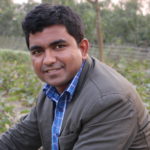The Cornell Alliance for Science has been heartened to meet and work with young people who are passionate about transforming farming and feeding the world. As our organization turns five, we take this opportunity to highlight five young change-makers who are making a difference in global agriculture.
 Narain TM is the founder of Reapmor Farms, a data-backed agricultural technology transfer start-up that partners with farmers in India, helping them realize the full potential of crop yield though a hyper-localized extension service.
Narain TM is the founder of Reapmor Farms, a data-backed agricultural technology transfer start-up that partners with farmers in India, helping them realize the full potential of crop yield though a hyper-localized extension service.
“In India almost all of the farmers are small and marginal farmers, ones who own less than 3 to 5 acres. These are the farmers who don’t understand technology and need assistance. We work only with these farmers. Our motto is to convert these farmers into progressive farmers, hence our tagline ‘Every farmer, a progressive farmer.'”
Reapmor started its operations with vegetables. “Currently we have five vegetables in our portfolio, but we plan to increase that to 12 in this year and also start incorporating non-vegetable crops in the future.” The service, now based in Tindivanam, 100 kilometers south of Chennai, is also expanding to six other locations this year, with a plan to be pan-India in six years.
“At a time when farmers are leaving agriculture due to it being unprofitable, our services not only help them continue farming by making it remunerative but also increase the yield to every variety’s potential, in some instances by 600 percent. Maximizing the yield across all the farms in the world should be the first step in tackling food security and would go a long way in feeding the world’s growing population.”
 Evans Okomeng is a 2016 Cornell Alliance for Science Global Leadership Fellow and the founder and CEO of Millennium Farms in Ghana.
Evans Okomeng is a 2016 Cornell Alliance for Science Global Leadership Fellow and the founder and CEO of Millennium Farms in Ghana.
“On my corn plantation I stood tiny, like a fish in the ocean, in the midst of crops that are in their prime of beauty, with fluffy tassels. As birds chirped, I looked across the field, beyond the horizon as the golden sunset. This is the moment of satisfaction for any farmer, to see his crops in very good condition with the hope of a bountiful yield at harvest.
“It all started two years ago while I was going through a journal that evaluated the state of agriculture with vivid descriptions of the challenges of now, tomorrow and the future in respect to drought, fall armyworm infestations and the implications therein for the future of food availability, accessibility and cost. I knew the chance had come for me to change the picture the journal painted, which I wasn’t proud of. My career path suddenly changed. I knew then I wanted to become a farmer!
“Looking back, I am proud I took the right choice of a noble work for myself as it’s my joy to contribute to the global food system. Today, I am happy to be cultivating some 10 acres of maize, raising some 2,000 tubers of yam and some handful of goats on my farm. Besides this, my network with the Cornel Alliance for Science has also offered me the opportunity to effectively communicate and advocate for the well-being of farmers in Ghana through several media platforms. Through such, I have had the opportunity of linking up with organizations in Ghana to mentor and motivate other young elites to venture into practical agriculture in order to shape new modern farmers who can read, write and appreciate and adapt to the benefits of science and technology to boost our local agricultural sector and ensure that every Ghanaian has enough food to eat and much to export to neighboring countries.
“Every day, I wake up to a new dawn of hope that three decades from now, when the world population soars to a zenith height of about 10 billion people, we won’t have to increase the amount of land or labor to cultivate our food, but rather incline ourselves to modern scientific applications of improved seeds—especially unprecedented, exclusive traits achieved through the biotechnology tools of genetic modification and gene editing—improved mechanization techniques through robotics and precision agriculture, and effective modern farming practices such as aeroponics and hydroponics to cultivate proficiently to meet our food demand. The advent of such novel technologies gives me hope of achieving a well-fed world.”
 Elizabeth Wangeci Njuguna of Kenya is a plant molecular biologist who earned a PhD in biochemistry and biotechnology from Ghent University.
Elizabeth Wangeci Njuguna of Kenya is a plant molecular biologist who earned a PhD in biochemistry and biotechnology from Ghent University.
“My PhD research—carried out at the VIB Center for Plant Systems Biology, Belgium and the Plant Transformation Laboratory at Kenyatta University, Kenya— entailed genetic engineering of maize to study drought stress response. I used various cutting-edge molecular biology tools, including the revolutionary CRISPR gene editing, to overexpress and knockdown genes that play a role in energy homeostasis in maize. The main target was to develop maize plants that conserve energy during stress response and therefore are able to survive longer during drought until the rain resumes. The products are not ready yet, but there is a proof of concept.
“The passion and motivation for my research was to contribute to developing solutions for the maize shortage problem in Kenya and African regions where maize is the staple food, and yet dependent on rainfall for production. A shift in rainfall pattern or lack of rain regularly affects yield, and this has been aggravated by climate change. Additionally, there is vast semi-arid land in Africa that could be utilized for maize production if drought-tolerant plants were grown, thus securing our staple food.
“Currently, I am pursuing a postdoctoral fellowship at the International Centre for Genetic Engineering and Biotechnology in Cape Town, South Africa. Here, I am involved in the development of biopesticides options for controlling fall armyworm, an invasive species that has spread all over sub-Saharan Africa, causing significant damage to maize crops and thereby reducing yield. I am also involved in the assessment of technical, policy and regulatory barriers to biopesticides adoption in the Southern Africa region and I am looking into ways of overcoming barriers to trade through harmonization of biopesticide regulation for selected countries in the SADC (Southern African Development Community) region. Biopesticides present a safer alternative to the synthetic chemical pesticides, some of which are harmful to human beings and the environment. Reducing the chemical residues levels on agricultural and horticultural products will definitely attract more markets for products from the SADC region and set the pace for the rest of Africa.
“I am passionate about science communication and feel that scientists have a great role to play in elaborating their work to different groups to avoid the confusion and misinformation that has badly tarnished the reputation of genetic engineering technology and its products. I have been engaged in advocacy for agricultural biotechnology and knowledge-sharing activities in Kenya among the youth, media players, farmers and legislators through my engagement with KUBICO (Kenya University Biotechnology Consortium).
“I have seen the advantages that genetic modification can offer in regard to drought-tolerance and pest control in GM maize field trials in Kenya. In the near future, embracing agricultural biotechnology will not be a choice but a necessity to feed the growing world population with healthy and balanced food that is produced sustainably and efficiently in the shrinking farming lands.”
 Talha Zubair Masror is a 2019 Alliance for Science Global Leadership Fellow and media-savvy agriculture officer in Bangladesh, bringing creativity and progressive new approaches to his work in order to accelerate the country’s agriculture extension system.
Talha Zubair Masror is a 2019 Alliance for Science Global Leadership Fellow and media-savvy agriculture officer in Bangladesh, bringing creativity and progressive new approaches to his work in order to accelerate the country’s agriculture extension system.
“Bangladesh’s economy and livelihood are based on agriculture. This country has achieved self-sufficiency in food after overcoming much deprivation and crisis. Behind this, farmers, agriculture scientists and agriculture extensionists have played an unparalleled role. The farmers of this country are very efficient, inquisitive, eager and innovative. They can quickly learn new ideas, techniques and methods of agriculture. Even though they are behind in academic excellence, they are wise in soil knowledge. They are confident. That is why they can easily deal with several adversities.”
Masror has pioneered the successful adoption of insect-resistant Bt brinjal (eggplant) in Bangladesh, personally distributing thousands of Bt brinjal seedlings to farmers and inspiring them to try the new crop through hundreds of demonstration plots and various farmer meetings and tours. His work has gained coverage by the Bangladesh National Television, DBC and Jamuna News channel.
He has also produced short documentaries highlighting successful farmers and modern technologies, including one on Bt brinjal that reached more than 80,000 people on social media. Most of the country’s agriculture officers now use his videos in need-based motivational training materials for farmers, encouraging them to reduce their pesticide use and improve their profits by cultivating the fruit and shoot borer-resistant Bt brinjal.
Masror’s YouTube channel, “Krishi Bioscope,” has created a great stir in the last two years, becoming a go-to source for important agriculture information and gaining about 210,000 subscribers. He has uploaded some 150 short videos on his channel, reaching more than 23 million viewers. A detailed report about his work was published on the front page of Bangladesh’s most popular national daily newspaper, Prothom Alo, and in 2017 he was awarded the Best Innovative Officer among all the departments of the Khulna division of Bangladesh.
“My goal is to motivate people to ensure safe food production using modern sustainable technology for the nation.”
 Ruramiso Mashumba is a 2019 Alliance for Science Global Leadership Fellow and an entrepreneur and farmer in Zimbabwe, where she was the first women elected as the National Youth Chairperson for the Zimbabwe Farmers Union.
Ruramiso Mashumba is a 2019 Alliance for Science Global Leadership Fellow and an entrepreneur and farmer in Zimbabwe, where she was the first women elected as the National Youth Chairperson for the Zimbabwe Farmers Union.
Mashumba has been recognized for her work in helping to lead women towards more mechanized farming in Africa. This means less time performing backbreaking labor in the fields, higher profit margins and the ability for more people to send their children to school.
“I’m training rural women in Zimbabwe in good agricultural practices. I believe that in order to end hunger and poverty, we cannot leave anyone behind. I also believe in advocating for access to technology that will help reduce poverty and hunger in rural livelihoods.”
Mashumba promotes biofortification—the process of breeding more nutritious varieties of staple crops to help tackle micronutrient deficiencies like vitamin A. She teaches women to give their children healthier and more diverse diets and sells her own brand of nutritious whole grains called Mnandi. She also safeguards crop diversity by continuing to grow an indigenous African variety of red rice called Oryza glaberrima that would otherwise be at risk of extinction in the area.
“In 2050 we will have an extra 1 billion people on the African continent, where 60 percent live in the rural areas. With support, they could help end hunger. As a woman living in a rural area, I believe I have a voice in this campaign.”
